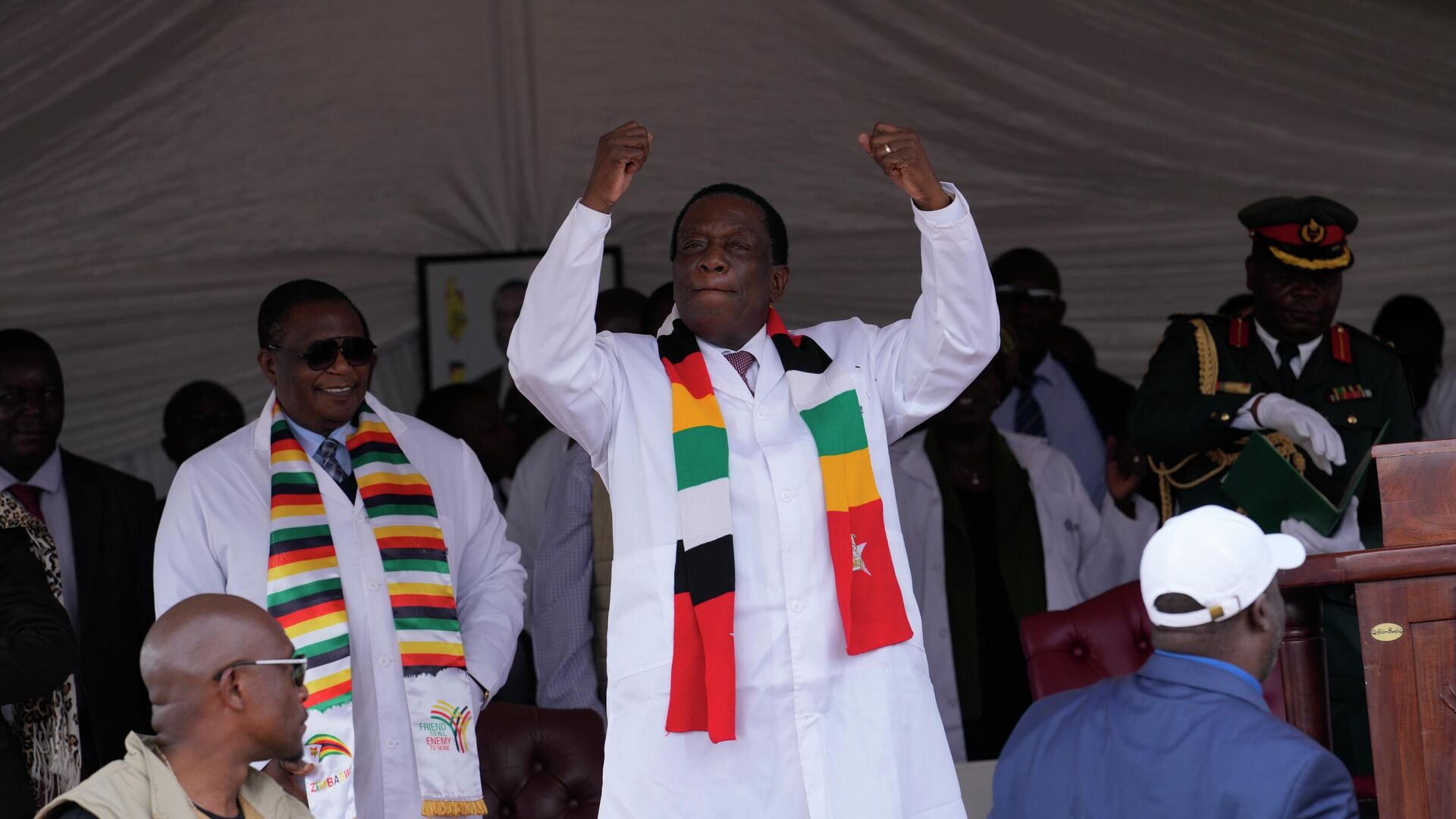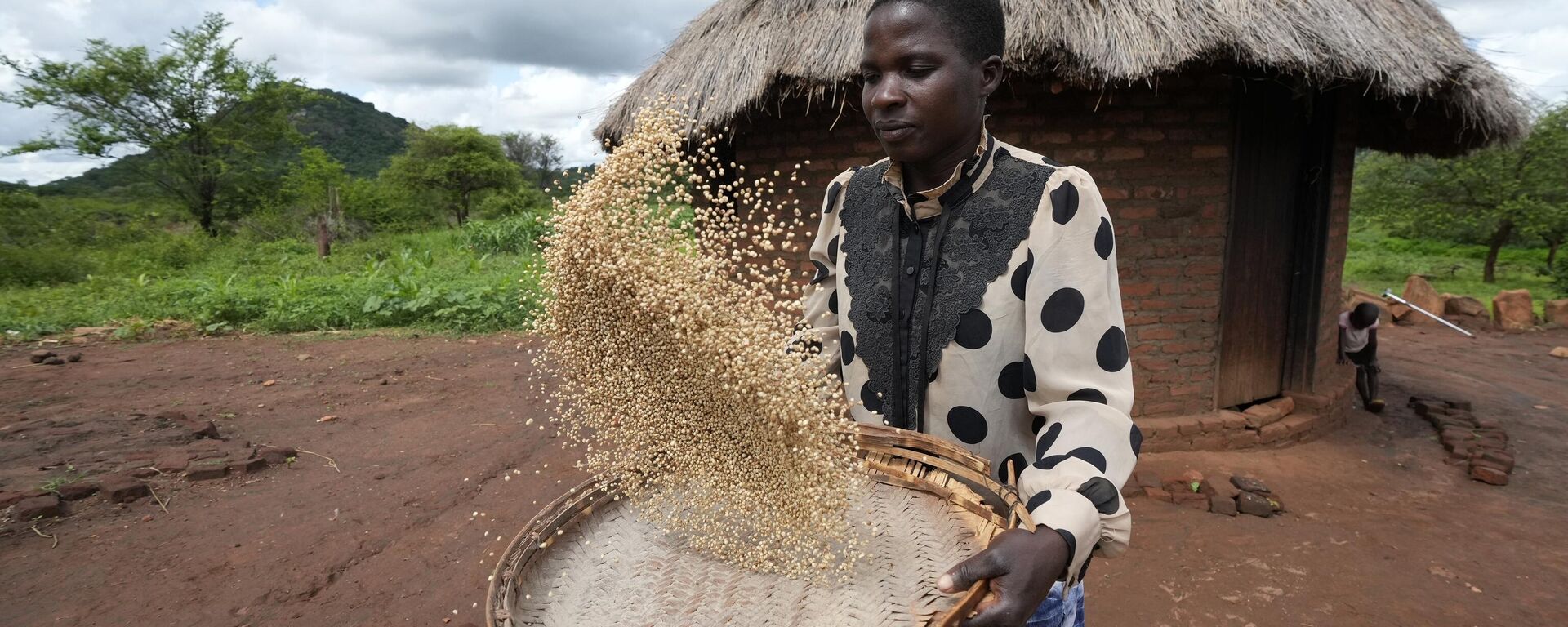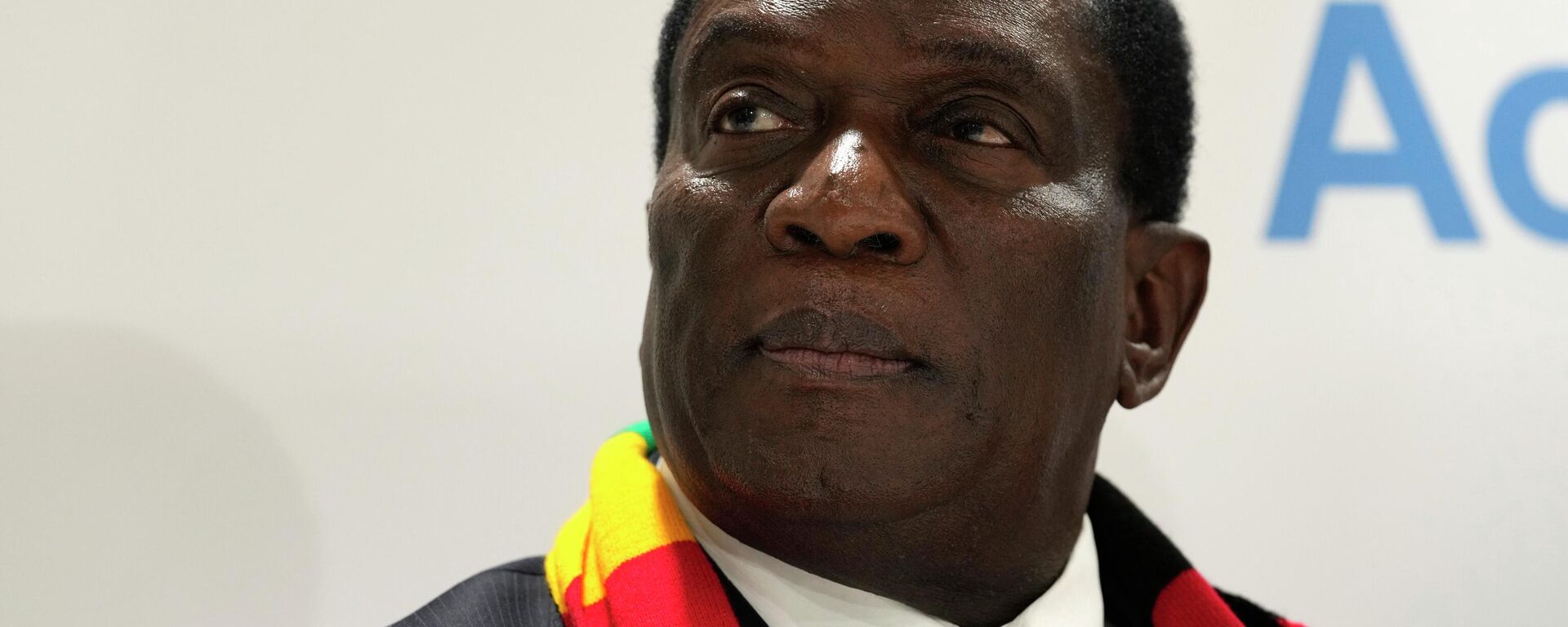https://en.sputniknews.africa/20230724/zimbabwes-second-republic-on-track-to-achieve-vision-2030-mnangagwa-says-ahead-of-election-1060729624.html
Zimbabwe's Second Republic on Track to Achieve Vision 2030, Mnangagwa Says Ahead of Election
Zimbabwe's Second Republic on Track to Achieve Vision 2030, Mnangagwa Says Ahead of Election
Sputnik Africa
The Second Republic of Zimbabwe is the term used by President Emmerson Mnangagwa to describe his administration, which came to power following the resignation... 24.07.2023, Sputnik Africa
2023-07-24T13:43+0200
2023-07-24T13:43+0200
2023-07-24T13:43+0200
sub-saharan africa
southern africa
zimbabwe
development
economic growth
food security
https://cdn1.img.sputniknews.africa/img/07e7/07/18/1060733296_0:0:3072:1728_1920x0_80_0_0_435359baf30f7d536afe1c13a157d746.jpg
Zimbabwe's President Emmerson Mnangagwa has vowed to continue improving the lives of Zimbabweans as he unveiled development projects his government has undertaken across the country.The president, who is seeking a second term in the country's August 23 general elections, said his government, which he calls the Second Republic, has revived some of the long-stalled projects such as the Gwayi-Shangani dam and the Harare-Beitbridge highway, which were proposed more than 100 years ago.Mnangagwa became president in November 2017 following the resignation of his fellow ZANU-PF party member and former President of Zimbabwe Robert Mugabe, who ruled the country for 30 years. Mnangagwa was initially sworn in as interim president before winning a five-year term in the 2018 general election.Addressing a rally of his ruling ZANU-PF party in Centenary, Mashonaland Central, on Saturday, President Mnangagwa also said his government had completed over 762 projects in that province alone.Despite Western economic sanctions imposed on the southern African nation, the leader said his government has made significant progress in building dams, clinics, schools and roads in every corner of the country.Achieving Food SecurityPresident Mnangagwa also commended Mashonaland Central Province for exceeding the target of 14,000 hectares of land under wheat production. He highlighted that Zimbabwe has achieved food security and is ready to export wheat to other countries.The leader noted that this achievement comes in the wake of the ongoing conflict in Ukraine, as his country was heavily dependent on Ukrainian grain imports before the conflict began in early 2022.He noted that Zimbabwe managed to produce more than its annual needs in 2022, while this year "we have even surpassed last year's production record", which is part of his government's of vision to make the country an upper-middle income economy by 2030.The president revealed his country's plans to begin exporting wheat in the near future, as recent achievements in the agricultural sector continue to bear fruit.Multi-Sectoral Development PlansPresident Mnangagwa said his government supports small scale miners and wants to give them mining rights as the country has many minerals such as gold, nickel, lithium and copper. He said these minerals should be exploited for the benefit of the nation.Mnangagwa also said that his government has developed small villages such as Kanyemba, a remote area that lacked basic facilities, after the First Lady visited and informed him of the situation. He said that his administration has built clinics, schools and a modern road there, and plans to make it a town.The president also addressed the issue of electrification, saying the government has resolved the power crisis that has plagued the country in recent years by boosting power generation from Hwange Power Station, the largest in Zimbabwe.Mnangagwa also said his government has opened more than 20 new public service centers across the country to make it easier for people to apply for vital documents.
https://en.sputniknews.africa/20230508/zimbabwes-improved-food-security-indicates-decline-in-hunger-rates-1059114263.html
https://en.sputniknews.africa/20230712/meet-the-zimbabwean-leader-most-trusted-by-his-citizens-1060486046.html
southern africa
zimbabwe
Sputnik Africa
feedback@sputniknews.com
+74956456601
MIA „Rossiya Segodnya“
2023
Muhammad Nooh Osman
https://cdn1.img.sputniknews.africa/img/07e7/04/0a/1058467512_0:0:1280:1280_100x100_80_0_0_ec723833bcbfcaed2e21952965ad99e4.jpg
Muhammad Nooh Osman
https://cdn1.img.sputniknews.africa/img/07e7/04/0a/1058467512_0:0:1280:1280_100x100_80_0_0_ec723833bcbfcaed2e21952965ad99e4.jpg
News
en_EN
Sputnik Africa
feedback@sputniknews.com
+74956456601
MIA „Rossiya Segodnya“
Sputnik Africa
feedback@sputniknews.com
+74956456601
MIA „Rossiya Segodnya“
Muhammad Nooh Osman
https://cdn1.img.sputniknews.africa/img/07e7/04/0a/1058467512_0:0:1280:1280_100x100_80_0_0_ec723833bcbfcaed2e21952965ad99e4.jpg
southern africa, zimbabwe, development, economic growth, food security
southern africa, zimbabwe, development, economic growth, food security
Zimbabwe's Second Republic on Track to Achieve Vision 2030, Mnangagwa Says Ahead of Election
Muhammad Nooh Osman
Writer/Editor
The Second Republic of Zimbabwe is the term used by President Emmerson Mnangagwa to describe his administration, which came to power following the resignation of former longtime ruler Robert Mugabe in 2017. Mnangagwa has stated his vision to transform Zimbabwe into an upper-middle income economy by 2030.
Zimbabwe's President Emmerson Mnangagwa has vowed to continue improving the lives of Zimbabweans as he unveiled
development projects his government has undertaken across the country.
The president, who is seeking a second term in the country's August 23 general elections, said his government, which he calls the Second Republic, has revived some of the long-stalled projects such as the Gwayi-Shangani dam and the Harare-Beitbridge highway, which were proposed more than 100 years ago.
Mnangagwa became president in November 2017 following the resignation of his fellow ZANU-PF party member and former President of Zimbabwe Robert Mugabe, who ruled the country for 30 years. Mnangagwa was initially sworn in as interim president before winning a five-year term in the 2018 general election.
Addressing a rally of his ruling ZANU-PF party in Centenary, Mashonaland Central, on Saturday, President Mnangagwa also said his government had completed over 762 projects in that province alone.
Despite Western economic
sanctions imposed on the southern African nation, the leader said his government has made significant progress in building dams, clinics, schools and roads in every corner of the country.
"I have been told that the Second Republic is also doing four major dam constructions. So, all the areas that had no water will now have water for irrigation and for their livestock," Mnangagwa said.
President Mnangagwa also commended Mashonaland Central Province for exceeding the target of 14,000 hectares of land under wheat production. He highlighted that Zimbabwe has achieved food security and is ready to export wheat to other countries.
The leader noted that this achievement comes in the wake of the ongoing conflict in Ukraine, as his country was heavily dependent on Ukrainian grain imports before the conflict began in early 2022.
"So, we sat as a team and asked ourselves why we were importing wheat when we have water for irrigation. I asked them what we could do in order to produce enough wheat for our annual consumption," Mnangagwa said. "They said we needed to put so much land under irrigation. We have all of that now. We have so much land under irrigation to ensure that we produce enough wheat each winter."
He noted that Zimbabwe managed to produce more than its annual needs in 2022, while this year "we have even surpassed last year's production record", which is part of his government's of vision to make the country an upper-middle income economy by 2030.
The president revealed his country's plans to begin exporting wheat in the near future, as recent achievements in the agricultural sector continue to bear fruit.
"My Minister of Agriculture is saying that we must start planning to export our wheat because we have more than what we require. Imagine if we had insisted on importing grain from Ukraine, where there is a war now! Surely, we would suffer," the Zimbabwean leader told his supporters.
Multi-Sectoral Development Plans
President Mnangagwa said his government supports small scale miners and wants to give them mining rights as the country has many minerals such as gold, nickel, lithium and copper. He said these minerals
should be exploited for the benefit of the nation.
Mnangagwa also said that his government has developed small villages such as Kanyemba, a remote area that lacked basic facilities, after the First Lady visited and informed him of the situation. He said that his administration has built clinics, schools and a modern road there, and plans to make it a town.
"We are constructing a state-of-the-art road to Kanyemba and also developing the place into a town. Three to four years from now, all of you will be migrating to Kanyemba," he told the rally.
The president also addressed the issue of electrification, saying the government has resolved the power crisis that has plagued the country in recent years by boosting power generation from Hwange Power Station, the largest in Zimbabwe.
Mnangagwa also said his government has opened more than 20 new public service centers across the country to make it easier for people to apply for vital documents.




